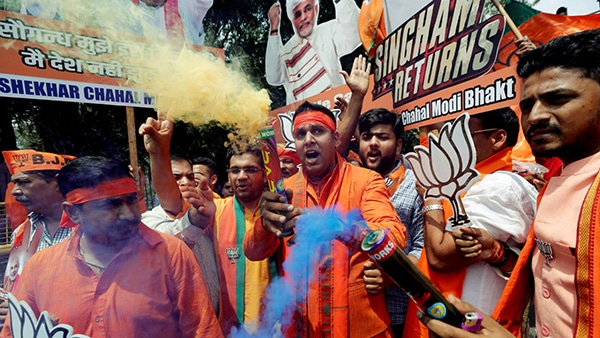
by Nava J. Thakuria 30 May 2019
When India nurtures nationalism with elections by Nava J. Thakuria Amidst all criticisms for majority based politics, Hindu-centric propagandas vertically dividing the country and one person worship, the ruling Bhartiya Janata Party (BJP) led National Democratic Alliance (NDA) Triumphed again in the recently concluded national elections of India (historically known as Bharat or Hindustan). With an undercurrent of cautious nationalism, the NDA crossed the tally of winners up to 353 in the 543 member Lok Sabha, the lower house of Parliament.
BJP alone emerged victorious in 303 Parliamentary seats crossing the magic number (272) to form the federal government in New Delhi, where the prime opposition party Indian National Congress along with its allies remained restricted within hundred seats in House of the People. The rightist political party, led by hardliner Prime Minister Narendra Damodardas Modi also succeeded in spreading its presence to almost all corners of the large south-Asian country.
States of Gujarat, Rajasthan, Madhya Pradesh, Delhi, Haryana, Himachal Pradesh, Uttarakhand, Chhattisgarh, Assam, Arunachal Pradesh along with Bengal, Odisha, Telangana, Uttar Pradesh, Bihar, Karnataka, Maharashtra, Jharkhand witnessed massive victory for candidates belonged to BJP or its allies, which was far better than the 2014 general elections.
The billion-plus nation witnessed seven-phase polling exercise (11 April to 19 May) through electronic voting machines (EVM) supported by the voter-verifiable paper audit trail (VVPAT) mechanism, where over
Seven hundred million voters participated in the process, conducted by the powerful Election Commission of India, to send their representatives for the next five years to rule the largest democracy on Earth.
As the counting of votes began on 23 May, which started reflecting the prediction of exit polls to indicate for a comfortable majority of NDA in 17th Lok Sabha, various foreign media outlets began circulating articles to downplay Modi’s magnificent poll-victories. Those media contributors termed the achievement of Modi as one man’s over-ambitious aggression to saffronisation of democracy to anti-minority trepidation etc.
Nothing to hide that PM Modi planned the electoral campaigns as Presidential style of polls where the prime slogan was Phir Ek Bar Modi Sarkar (Once Again Modi Government-not NDA or BJP government).
Even though putting an exclusive focus on one individual contradicts to the concept of India’s decades’ long Parliamentary democracy, but the entire opposition could not resist the tendency.
Precisely, they had none who can match Modi’s personality, oratory skill, and leadership quality.
Riding on a pro-incumbency wave, PM Modi along with the saffron party chief Amit Shah promoted national pride & patriotism with the clean ideology of Rashtriya Swayamsevak Sangh (RSS). Moreover, the Hindu nationalist premier adopted an aggressive foreign policy to enhance India’s relationship with various superpowers like USA, Russia, China, Japan, UK, Israel, etc.
While the opposition leaders repeatedly termed Modi as a liar and thief, millions of electorate including a large section of young & educated voters seemingly realized various achievements of Modi government referring to clean India movement, corruption-free image, digitalization of financial exercises, skill development initiatives, medical benefits, new bank accounts to poor families irrespective of their religion, caste, creed etc.
At least 220 million Indians were directly benefited from various welfare schemes of Modi government ranging from new toilets to houses for low-income families, cooking gas & electricity connection to health insurance schemes, etc. Moreover, Modi projected himself as a capable leader to address terrorism that is homegrown or exported from outside (say Pakistan) successfully in front of India’s new generation of internet savvy voters.
One strong message, which was emerged from national poll outcomes, indicated that the present generation of the electorate would no longer support the dynastic politics. Not only the (Indira-Rajiv) Gandhi dynasty that faced wraths from the voters, but also the political families of Lalu Prasad Yadav, Mulayam Singh Yadav, Ms. Mayawati, Sharad Pawar, Bhupinder Hooda, Ashok Gehlot, etc. also encountered refusals in the poll-battles.
Even in the restive Northeast, where separatist militants once ran parallel administrations, the Lotus bloomed for the saffron party. The region with 25 Parliamentary seats was swept by the BJP and its allies to elect 18 members to the NDA tally. More importantly, voters of Arunachal Pradesh and Sikkim have opted for BJP and NDA constitute Sikkim Krantikari Morcha (SKM) for their province governments in Itanagar and Gangtok.
BJP recorded the best performance in the region surrounded by Nepal, Bhutan, Tibet (China), Myanmar and Bangladesh.
Keeping alive the national trend, where many veteran Congress leaders lost the electoral battles, northeastern voters also rejected many influential Congress candidates. While the grand old party was losing its vote-shares, BJP nominees had won two LS seats of Tripura and one seat in Manipur for the first time.
Unlike many parts of the country (particularly West Bengal), where various phase of polling marred with violence, northeastern region witnessed very peaceful, participatory and smooth electoral process that might have helped the residents of diverse ethnic communities to nurture a new kind of nationalism where the electorate set aside their differences and came forward for a robust, safe and prosperous Bharat.
With Islamist-sponsored terrorism continues grabbing the international media headlines and also affecting India’s neighboring countries, the mainstream Indians perhaps accepted the Hinduism enriched nationalism for their safety and security. During the elections, an invisible wave of nationalism defied the relentless campaigns generated by the so-called secular, tolerant and liberal sections based inside and outside the country that enjoys thousands year legacy of Hinduism.
